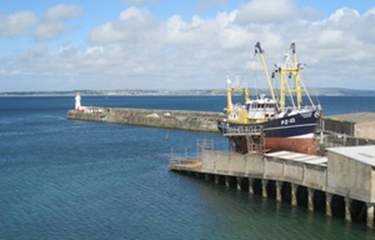The United Kingdom Marine Management Organisation (MMO) is entering the final phase of the second attempt to rollout inshore vessel monitoring systems (I-VMS) devices for the nation’s 6 to 12-meter fishing fleet.
The MMO announced that the rollout schedule is entering its final phase and said it is urging any fisher with a vessel measuring over 6 meters to take advantage of funding of up to GBP 1,050 (USD 1,271, EUR 1,203) in grant funding.
“We’re in the final phase of the roll-out with just six weeks to go before the funding deadline. It’s crucial that fishers act right now and order a device if they are to take advantage of the funding,” MMO Director of Operations Peter Clark said. “It’s positive to see half of the over six-meter fleet has ordered devices for their vessels, but there is a time limit to this funding and there are still too many owners taking the risk of having to pick up the full cost.”
The MMO is planning to make I-VMS devices mandatory for all vessels under 12 meters – both foreign and domestic – fishing in English waters. However, the first rollout was paused after a review of some of the devices found they were inadequate.
Feedback from users claimed two of the four “type-approved” devices – the Satlink Nano and the Maritime Systems MS44 – didn’t actually meet the standards. Following the accusation, the MMO commissioned independent testing and determined the accusations were accurate and that they didn’t measure up to some of the requirements.
Those tests were disputed by Maritime Systems, the manufacturer of the MS44. The company claimed its only fault was that if its device was submerged for 30 minutes a “small amount of water” would work its way through the outer casing – a fault other devices shared. However, Maritime Systems Managing Director James Glover said the MMO never gave them the chance to rectify any issues.
“Suppliers were originally made aware of the issues in March and asked to provide a proposal on how to rectify their issues. Since submitting its proposal to the MMO in March, Maritime Systems had regularly asked the MMO if they required any more information but never received a reply,” Maritime Systems said. “On Thursday 18 May, without consultation, the MMO revoked Maritime Systems Type Approval due to lack of detail in the proposal and was provided 20 hours to submit a new response, stating that it would be a ‘high bar for us to reconsider the revocation.’”
Glover called the process a “clear witch hunt by senior management at the MMO.”
“Other suppliers are allowed to fix their devices, yet the MMO won’t even have a fair discussion with me,” he said.
Regardless of Glover’s objections, the U.K. restarted the I-VMS rollout in August, now with just two approved devices – the Fulcrum Nemo and Succorfish SC2.
According to the MMO, 50 percent of vessels over six meters in length have now purchased a device, and many ports have reported over 75 percent of their fleets have placed orders. Of those placing orders, 90 percent have claimed grants and GBP 400,000 (USD 484,700, EUR 458,700) in grant funding has been doled out.
Photo courtesy of the Marine Management Organisation







